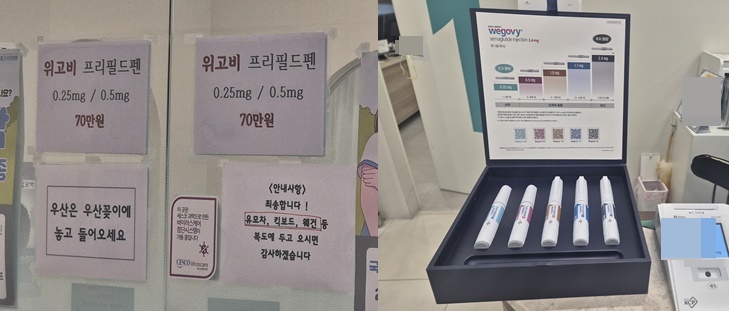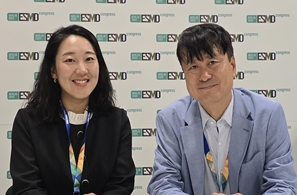- Wegovy vs Mounjaro in KOR…who's the winner?
- by Moon, sung-ho | translator Hong, Ji Yeon | Jan 9, 2025 05:56am
At the end of last year, Novo Nordisk's obesity drug 'Wegovy (semaglutide),' which gained popularity and was in short supply in the global market, was finally introduced to clinical practices in South Korea.
After that, new drugs with significant weight-loss effects are being introduced into South Korea, indicating a shift in the paradigm of obesity treatment. The companies have applied for expanded indications for these drugs, influencing clinical areas.

Wegovy received domestic marketing authorization in April with indications to aid weight-loss overweight patients who have a Body Mass Index (hereafter referred to as BMI) of 30kg/m2 or higher or those who are overweight with early BMI of 27kg/m2 or higher and below 30kg/m2 and having one or more weight-related accompanying diseases.
Additionally, in July 2024, Wegovy also receive approval for the indication to reduce risks of major cardiovascular events (death from cardiovascular diseses, non-fatal cardial infarction, or non-fatal cerebral strok) in overweight or obese patients with early BMI of 27 kg/m² or higher with cardiovascular diseases.
Upon the launch of Wegovy, Novo Nordisk Korea actively worked to secure market dominance in the Korean obesity treatment market, using about 80 sales and marketing employees. As a result, Wegovy is currently being used in medical clinics as a non-reimbursable drug. Patients pay an average cost of KRW 700,000-800,000 per month for treatment.
"Japan's drug price seems to be the world's lowest, but it is covered by insurance. It has been launched as the lowest price globally among non-reimbursed drugs," Chul Jin Lee, President of the Korean Society for the Study of Obesity (Joeun Family Health Clinic), said. "It is likely that the company has considered the potential launch of Mounjaro (tirzepatide) in Korean clinical practices."
Wegovy's company seems to be attempting to dominate the market by entering the domestic clinical field ahead of Mounjaro.
The industry's interest is now on the launching date of 'Mounjaro,' known as Wegovy's rival. Lily Korea plans to introduce the drug to clinical practices in South Korea this year.
In addition to Mounjaro's approval for type 2 diabetes, Lily Korea received extended approval for the drug as an adjuvant therapy for chronic weight control, which is similar to Wegovy. Although it is being sold in the market for obesity treatment as the product name 'Zepbound,' Mounjaro will be used for treating diabetes and obesity in South Korea.
Regarding this, Lily's recent announcement of the top-line results of the open-label SURMOUNT-5 Phase 3 clinical trial draws attention. This study directly compared the effects of Mounjaro to Wegovy.
According to the results presented, patients treated with Mounjaro had greater weight loss effects compared to those treated with Wegovy. This finding indicates that Mounjaro is superior in a one-on-one comparison to Wegovy.
In the clinical study involving 751 patients who are obese or overweight without diabetes, patients treated with Mounjaro for 72 weeks had a weight loss of 22.67kg, which is an average loss of 20.2% of the body weight.
During the same period, patients treated with Wegovy had a weight loss of 13.7% (14.96kg). When the weight loss range was compared, Zepbound showed about 47% superior effects than Wegovy.
Consequently, when Mounjaro becomes available in the Korean market, Wegovy will likely face a short-lived 'popularity.'
"Mounjaro in the form of vial is under consideration of domestic approval," Lee said. "Mounjaro's yearly cost is about KRW 3 million less than what Wegovy costs. Moreover, the drug price of vial formation saw a 50% reduction in the United States. When it launches in South Korea after obtaining approval, Mounjaro will likely priced significantly less. For this reason, clinical practices are closely watching Mounjaro."
"When vial formation becomes available, doctors prefer using those than pen types," Lee added. "A weekly vial package treatment regimen would be optimal."
Due to Wegovy and Mounjaro's success, GLP-1 emerged as the R&D trend in the domestic and foreign pharmaceutical and biotech industries.
Recently, the FDA granted approval for Zepbound, containing a similar active ingredient to Mounjaro, for sleep apnea. In addition to its diabetes and obesity indications, the extended indication of sleep apnea suggests an increased volume of usage. Also, an extended indication is likely approved in South Korea.
Companies witnessing these successes are evaluating the possibility of metabolic dysfunction-associated steatohepatitis (MASH) treatment since GLP-1 improves insulin secretion and sensitivity, improving blood glucose control.
Because MASH is caused by fat buildup in the liver of people who consume little or no alcohol, weight loss can have a positive effect on patients.
For this reason, pharmaceutical companies have determined that GLP-1 can be a treatment for MASH, alongside diabetes and obesity, and are currently conducting clinical trials.
The same goes for Wegovy and Mounjaro's active ingredients, semaglutide and tirzepatide.
Novo Nordisk and Lily are assessing the clinical utility of those drugs in patients with MASH, conducting phase 2 and phase 3 clinical trials, respectively. The industry is anticipating potential extended indications.
Additionally, survodutide, under development by Boehringer Ingelheim, demonstrated clinical utility in a phase 2 trial, emerging as a new drug candidate for MASH.
The biotech industry in South Korea is also considering the possibility of new GLP-1 drugs. Many companies have begun clinical studies.
The outstanding companies are ProGen and D&D Pharmatech.
ProGen is gaining attention for its new drug development in diabetes and obesity fields. The company is developing 'PG-102,' which works bi-specifically by binding GLP-1·GLP-2.
ProGen's new drug candidate received approval from the Ministry of Food and Drug Safety (MFDS) for conducting a domestic phase 2 trial. ProGen aims to maximize the effects, such as improving intestine function, glucose uptake in adipose tissue, and alleviating chronic inflammation by targeting both GLP-1 and GLP-2.
Kun-Ho Yoon, Chief Medical Officer of Progen (Endocrinology Specialist), says the significance of the study is that "Since there have been no new drug candidates that simultaneously target both GLP-1 and GLP-2, ProGen's 'PG-102' can be a first-in-class candidate treatment."
D&D Pharmatech is conducting clinical trials for its GLP-1 agent for various fields, including MASH, Parkinson's disease, and dementia. Last year, the company initiated a Phase 2 trial after receiving the FDA approval of its Phase 2 trial Investigational New Drug (IND) application.
The Phase 2 trial is being conducted in 10 clinical trial centers, and the trial involves 68 patients who are overweight or obese with accompanying MASH. The Korean clinical practices are closely watching the D&D Pharmatech's achievements.
"D&D Pharmatech has GLP-1 and GLP-2 bi-specific agents and amylin-based products," Lee said. "The company has a competitive edge, especially having a proprietary platform for switching an agent to oral formation alongside having injectable."
"Regarding developing a GLP-1 formation, the key to success is which company could diversify with lesser cost," Lee remarked. "The success in the market competition will be determined by providing various clinical benefits at lower prices for injectable, vial, and oral formations," Lee projected.
-

- 0
댓글 운영방식은
댓글은 실명게재와 익명게재 방식이 있으며, 실명은 이름과 아이디가 노출됩니다. 익명은 필명으로 등록 가능하며, 대댓글은 익명으로 등록 가능합니다.
댓글 노출방식은
댓글 명예자문위원(팜-코니언-필기모양 아이콘)으로 위촉된 데일리팜 회원의 댓글은 ‘게시판형 보기’와 ’펼쳐보기형’ 리스트에서 항상 최상단에 노출됩니다. 새로운 댓글을 올리는 일반회원은 ‘게시판형’과 ‘펼쳐보기형’ 모두 팜코니언 회원이 쓴 댓글의 하단에 실시간 노출됩니다.
댓글의 삭제 기준은
다음의 경우 사전 통보없이 삭제하고 아이디 이용정지 또는 영구 가입제한이 될 수도 있습니다.
-
저작권·인격권 등 타인의 권리를 침해하는 경우
상용 프로그램의 등록과 게재, 배포를 안내하는 게시물
타인 또는 제3자의 저작권 및 기타 권리를 침해한 내용을 담은 게시물
-
근거 없는 비방·명예를 훼손하는 게시물
특정 이용자 및 개인에 대한 인신 공격적인 내용의 글 및 직접적인 욕설이 사용된 경우
특정 지역 및 종교간의 감정대립을 조장하는 내용
사실 확인이 안된 소문을 유포 시키는 경우
욕설과 비어, 속어를 담은 내용
정당법 및 공직선거법, 관계 법령에 저촉되는 경우(선관위 요청 시 즉시 삭제)
특정 지역이나 단체를 비하하는 경우
특정인의 명예를 훼손하여 해당인이 삭제를 요청하는 경우
특정인의 개인정보(주민등록번호, 전화, 상세주소 등)를 무단으로 게시하는 경우
타인의 ID 혹은 닉네임을 도용하는 경우
-
게시판 특성상 제한되는 내용
서비스 주제와 맞지 않는 내용의 글을 게재한 경우
동일 내용의 연속 게재 및 여러 기사에 중복 게재한 경우
부분적으로 변경하여 반복 게재하는 경우도 포함
제목과 관련 없는 내용의 게시물, 제목과 본문이 무관한 경우
돈벌기 및 직·간접 상업적 목적의 내용이 포함된 게시물
게시물 읽기 유도 등을 위해 내용과 무관한 제목을 사용한 경우
-
수사기관 등의 공식적인 요청이 있는 경우
-
기타사항
각 서비스의 필요성에 따라 미리 공지한 경우
기타 법률에 저촉되는 정보 게재를 목적으로 할 경우
기타 원만한 운영을 위해 운영자가 필요하다고 판단되는 내용
-
사실 관계 확인 후 삭제
저작권자로부터 허락받지 않은 내용을 무단 게재, 복제, 배포하는 경우
타인의 초상권을 침해하거나 개인정보를 유출하는 경우
당사에 제공한 이용자의 정보가 허위인 경우 (타인의 ID, 비밀번호 도용 등)
※이상의 내용중 일부 사항에 적용될 경우 이용약관 및 관련 법률에 의해 제재를 받으실 수도 있으며, 민·형사상 처벌을 받을 수도 있습니다.
※위에 명시되지 않은 내용이더라도 불법적인 내용으로 판단되거나 데일리팜 서비스에 바람직하지 않다고 판단되는 경우는 선 조치 이후 본 관리 기준을 수정 공시하겠습니다.
※기타 문의 사항은 데일리팜 운영자에게 연락주십시오. 메일 주소는 dailypharm@dailypharm.com입니다.









